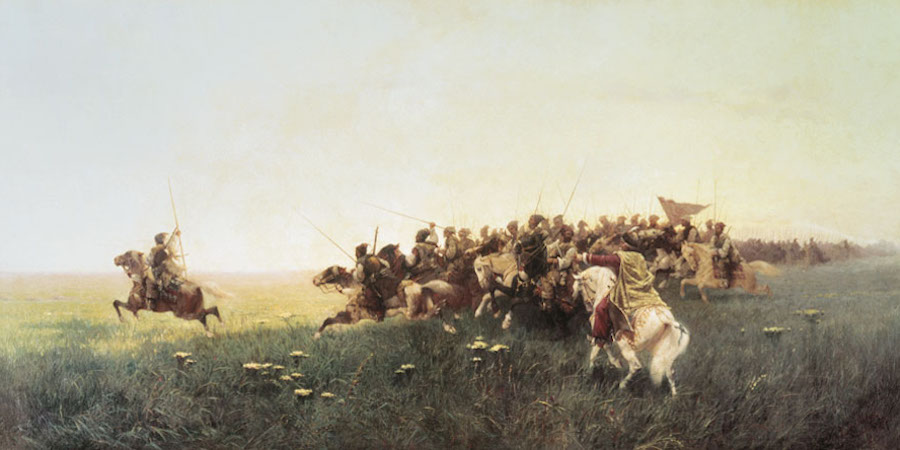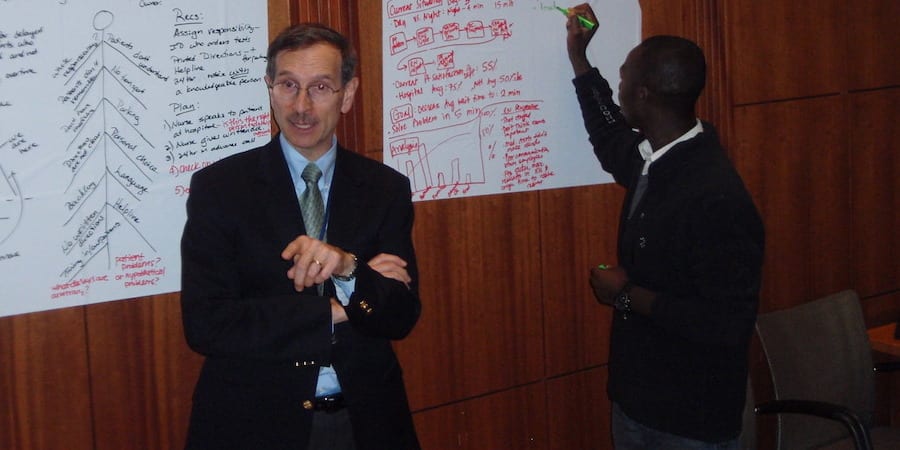
Self-organization, the Cossacks way
FEATURE – Resilience and the ability to self-organize have been part of Ukrainian culture for centuries. Today, as the war continues, the country’s companies and resistance are tapping into those values.
Words: Serhii Komberianov and John Shook
As this week’s webinar Ukrainian Resilience: How Lean is Helping Companies Cope with War and human history illustrate, war represents the worst in humankind, but it can also bring out its best. From the remarkable example of leadership shown by President Zelenskyy to the logistics challenges being answered by the companies featured in the webinar, the Ukrainian response to the Russian invasion provides inspiration as well as practical lessons for us all.
The heroic stories coming out of Ukraine have generated tremendous global scrutiny and analysis. They also have us wonder whether there is anything peculiar about the resilience and self-reliance on display in Ukraine? If so, where do they come from?
Ukrainians have always made of self-organization a way of living, which can be traced all the way back to the Cossacks. A semi-nomadic people who lived in the steppes of Ukraine, the Cossacks enjoyed high levels of autonomy in exchange for the military services they provided to the different states they nominally lived under.
In particular, the Zaporozhian Cossacks are considered heroes by modern-day Ukrainians. Not only did they play an important role in shaping the geopolitics of Europe, but they also created a semi-autonomous, military-administered “proto-state” that is considered by many scholars as an early, peculiar example of democratic organization. In their system, officers were elected, and the supreme power belonged to an assembly.
An article appeared on The Economist last month drew a connection between the Zaporozhian Cossacks and the charismatic leadership of President Zelenskyy and of Valerii Zaluzhnyi, commander-in-chief of the army, offering an impressive analysis of the potential reasons behind the success of the Ukrainian army – and, indeed, the whole country – in the war with Russia.
As I read the article, I couldn’t help but think of the many companies Lean Institute Ukraine is currently supporting through this difficult time. In these organizations, we can clearly see the same spirit of self-organization that drove the Cossacks. To solve the many problems they face, Ukrainian companies are relying not on the government, but on their resilience and wits.
In truth, signs of this were already visible during the Covid-19 pandemic: when most Western countries helped companies to cover their losses and pay for salaries, in Ukraine businesses mostly had to figure it out by themselves and were able to successfully recover even without external support.
Over the past two months, it’s also been incredibly interesting to see how Lean Thinking and Agile are making Ukrainian companies more adaptable.
The autonomy companies in my country are displaying has encouraged everyone, from leaders to operators, to fight harder and to be more creative. We saw this during the first weeks of the war, when companies didn’t ask the government for help and relied entirely on themselves to solve their problems. In the process, many of them even helped the army. They organized their relocation mostly by themselves and set up business support groups to effectively help each other.
LEADERSHIP, IN THE ARMY AND IN BUSINESS
This spirit of self-reliance and self-organization permeates Ukrainian leadership, too, and at several levels. It certainly does in the military. The article from The Economist, for example, mentions how General Zaluzhnyi (who never served in the Soviet army) told his officers to “turn your face to the people, to your subordinates.” He allows local commanders to take a lot more initiative than it was normal in post-Soviet armies and routinely listens to the advice of his senior officers.
This could be called lean and agile thinking, and we can see how it is strongly influencing the behaviors of leaders in Ukrainian companies. Due to broken communication channels, the traditional vertical leadership structure simply cannot work at the moment. Many companies were left without Internet connection and mobile coverage, and yet their self-organized teams managed to evacuate people, move critical equipment, and re-start production elsewhere (sometimes even switch to new products).
It is very interesting to see how, across the Ukrainian resistance, people are organizing in small, agile groups to fight the enemy more effectively. Reports from the front line tell us of defenders self-organizing to counter enemy attacks in the Wild Fields, the Pontic steppe stretching through southern and eastern Ukraine that was once home to the Cossacks and that is today seeing the worst of the fighting.
So many companies of Ukraine are acting in a similar way. Workers break out in smaller groups, each tasked with tackling a pressing issue – one is trying to find materials for production, another is renegotiating the orders that can’t be delivered, another one still is trying to find people who can come and join the workforce (people who haven’t left the country or joined the fighting). As we lean and agile thinkers know, working in small teams to achieve small goals, in small iterations, through small sprints is an easier and more manageable way of reaching the future state we envisage.
At Lean Institute Ukraine, we have experienced this firsthand. To fight the fear for our lives and the massive stress we are under, we have not only decided to meet virtually every day – in the morning and in the evening, like we did at the office – to lift each other up and keep busy (mentally, it helps a lot), but we are also giving ourselves small tasks to complete. Things like connecting routinely with all our customers, checking our finances, or understand the current situation with our servers.
Ultimately, it is a basic human need to feel useful. Times of crisis make this need ever more pressing. Each attainment may be small now, but they add up. That is the Cossack way.
To support our colleagues in Ukraine and the important work to are doing to help Ukrainian organizations to cope with the war, please donate here.
THE AUTHORS


Read more


FEATURE – Aligning supply flows with demand is crucial to success, but it can be complicated. Lean Thinking can help us identify the strategy and sequence of activities that we need to make it a reality.


PROFILE – Another month, another inspiring profile of a lean practitioner. We were impressed by Dr Billi’s deep conviction in the idea that, first of all, leaders must be learners. You will be too.


FEATURE – We assume that what holds our transformations back is the lack of high-price resources, but more often than not it is the simplest of items.



NEWS - LGN's Polish affiliate is taking part in a European project to shed a light onto the development of meta products.

